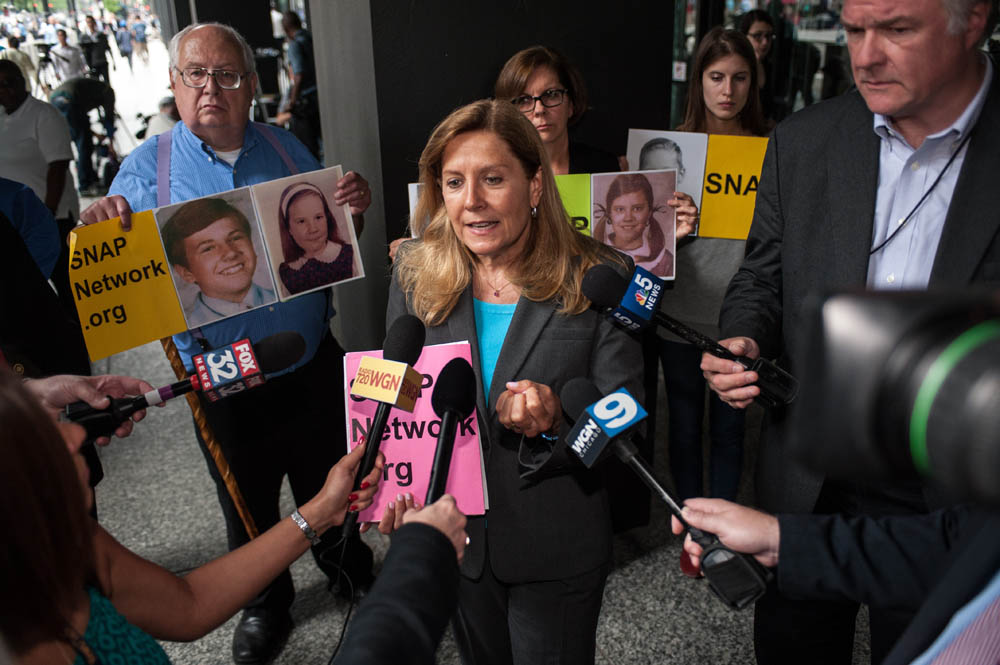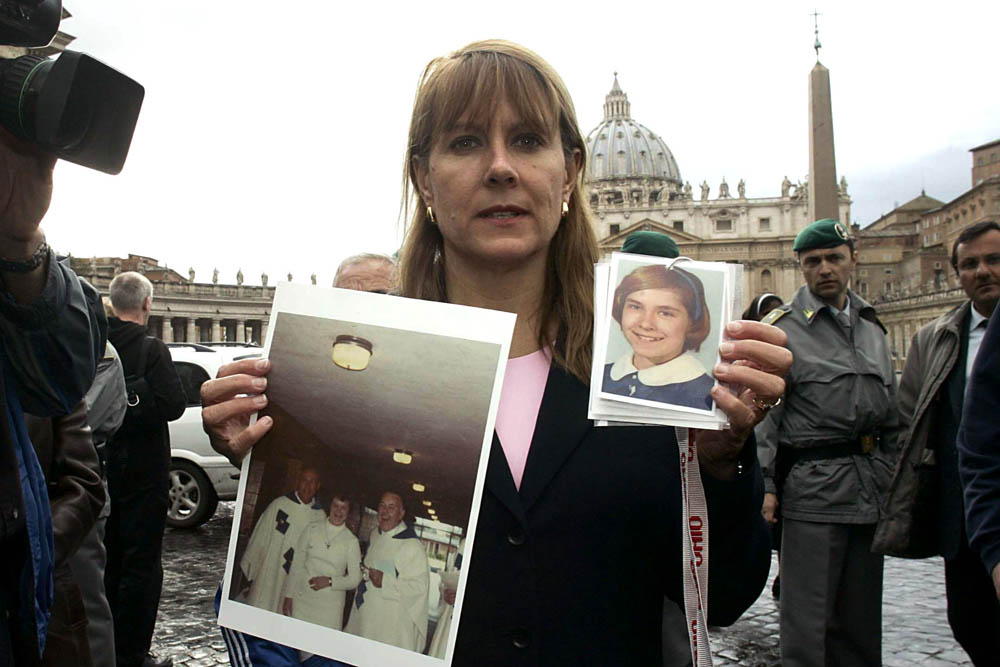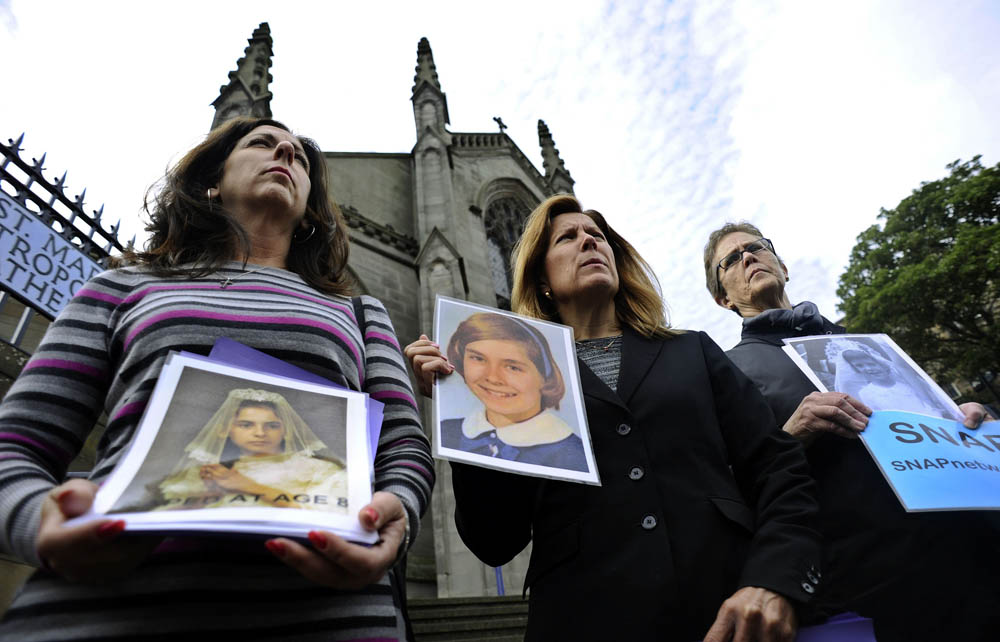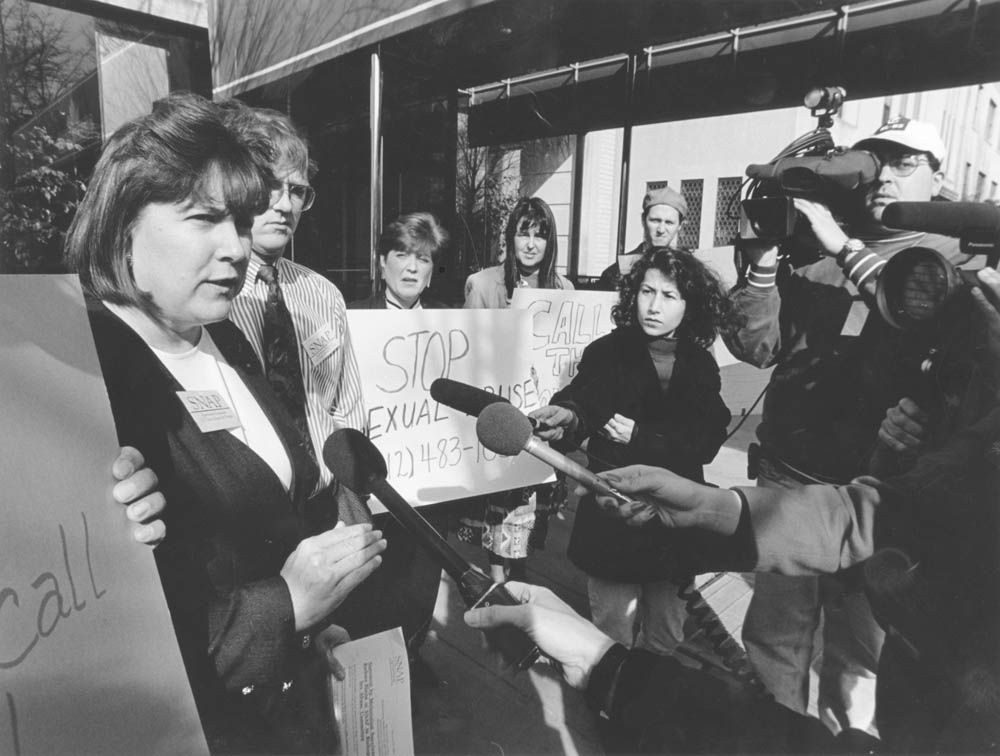
Barbara Blaine speaks to the press in Chicago in June 2015. (Newscom/Polaris/Robert Kusel)
Story updated Sept. 26 at 12:25 p.m., CDT, with additional reaction.
Barbara Blaine, the founder and former longtime president of the Survivors Network of those Abused by Priests, or SNAP, has passed away at age 61 in Utah, where she was vacationing with her husband.
According to a Sept. 24 statement from Blaine's family, the renowned advocate for victims of childhood sexual abuse by clergy died after falling ill from a sudden, unexpected cardiac condition Sept. 18. By many accounts, Blaine was known to keep herself in excellent physical shape, a fact that made the loss that much heavier for family, friends and fellow survivors.
"I'm just shocked and have profound sadness," said Barbara Dorris, SNAP's current managing director. "The world has lost a very wonderful woman. I'm sad. That's all we can be. She was way too young, wasn't sick. The only word is 'sad.' "
In a written statement, Blaine's family said that "she was truly a remarkable human being, and her spirit will remain with us, shaping our choices for the better, steering us away from petty concerns and encouraging us to lean in towards compassion, that we might honor her memory."
Dorris, who has led SNAP since Blaine resigned last February, recalled Blaine's seemingly boundless energy for exposing sexual perpetrators and calling the Catholic Church to task for its long history of protecting them. When travelling with Blaine in Europe sometime in the 2000s, SNAP scheduled a media event that was poorly attended, Dorris said. But Blaine hit the pavement and knocked on doors of any media outlet willing to hear the stories of clergy abuse victims.
"We were going to the radio and TV stations and newspapers and she was saying 'You need to listen to me, to what's happening in your country.' She wouldn't take no for an answer," Dorris said.
From its beginnings as a small, loose collection of survivors of Catholic clergy abuse, the movement exploded with wave after wave of revelations detailing systemic sexual abuse by priests, bishops, deacons, brothers nuns and other church functionaries who perpetrated horrors — mainly on children. Blaine and her fellow survivors helped expose thousands of predators and, very often, the equally shocking truth that those predators were protected at every level of the institutional church.
The movement reached critical mass in 2002 when The Boston Globe published its exhaustive, Pulitzer Prize-winning investigation into decades of crimes at the expense of the unsuspecting faithful of the region. The series led to similar investigations by media and government bodies across the U.S. and the world, as well as thousands of legal cases resulting in billions of dollars in payouts by the church and even some criminal convictions.
The Boston Globe's series inspired "Spotlight," the dramatic enactment of the Globe's investigation which won the Academy Award for Best Picture of 2016.

Barbara Blaine, holding a photo of herself as a child, protests at the Vatican in April 2005. (ZUMA Press/La Presse/Mauro Scrobogna)
"I don't think any of us had any clue that the victims' movement was going to turn into this," Dorris said. "It's beyond our wildest dreams."
Phil Saviano, who founded SNAP's New England chapter and played a key role in the Boston revelations, said he was inspired after seeing Blaine on Phil Donahue's talk show in the early 1990s. He reached out to Blaine for support and found healing, but also the courage to advocate for change.
"I felt like I was stumbling into some huge secret no one was talking about," Saviano said. "That was her great gift in life: She was able to relate to many survivors and convince them to be able to start talking about this."
The movement continued to snowball, Saviano said, eventually leading Blaine to testify in front of multiple state legislatures in attempts (often successful) to change laws in favor of victims. Blaine's advocacy even took her and SNAP to the International Criminal Court at The Hague in the Netherlands where they tried, unsuccessfully, to persuade the ICC to investigate the Vatican and then Pope Benedict XVI for crimes against humanity.
Though that effort failed, Saviano noted that the church was ultimately excoriated by the United Nations which faulted it for failing to protect children.
Jason Berry, who met Blaine through his seminal reporting on church malfeasance, expressed great sadness at Blaine's passing. Berry credited her as one of the main catalysts in the sea of change that swept the church.
"She was obsessed and her obsession was with justice. That's a lonely road," Berry said. "I've known very few people who had that kind of steely tenacity and commitment."

Members of the Survivors Network of those Abused by Priests, including Barbara Blaine (center), and Barbara Dorris (right), hold portraits of themselves as youths during a protest outside St. Mary's Catholic Cathedral in Edinburgh, Scotland, Sept. 15, 2010, the day before Pope Benedict XVI was to arrive for a four-day visit to Britain. (CNS/Reuters/Dylan Martinez)
Blaine's advocacy put her largely at odds with the institutional church, said Detroit's retired auxiliary bishop, Thomas Gumbleton, a longtime friend. With Blaine standing by his side, Gumbleton in 2005 went public with claims that he, too, had been sexually abused as a 15-year-old seminarian.
"I had bishops tell me she was practically a devil against the church," Gumbleton said. "And also — it was so cruel — that she and many other survivors were only in it for the money."
Gumbleton went on to say that most bishops failed miserably in responding to the abuse claims and Blaine took that hurt very personally. "Instead of getting a pastoral response the survivors got an adversarial response," he said.
Even so, Gumbleton said, "SNAP was one of the most important things that happened in bringing the sex abuse crisis to the forefront and it caused the bishops to do much more than they were doing and it helped stop the cover up."
Illinois Supreme Court Justice Anne Burke, an inaugural member of the bishops’ National Review Board (2002-04), said it was Blaine “at the forefront” of ensuring that victims were the focus of the board’s work in overseeing the implementation of the Dallas Charter.
“Without Barbara, SNAP and the other survivors in that organization, I don’t think we would be where we are today in our Catholic Church or in society about transparency on these issues,” Burke said.
Living with abuse, then sharing her story
Blaine was born and raised in Toledo, Ohio, as part of a large, devout Catholic family. In a 2004 interview, Blaine said she was first sexually abused by a priest when she was a 13-year-old between seventh and eighth grade at West Toledo's St. Pius X school. The year was 1969, and the priest was a 42-year-old member of the Oblates of St. Francis DeSales. Chet Warren — subsequently named a defendant in multiple sex abuse lawsuits and a priest identified by the Diocese of Toledo as a serial offender — preyed on Blaine's veneration of priests.
"I was part of a group of junior high girls called 'The Deaconettes' that helped clean up after mass. One Sunday, Father Warren invited me to stay and have dinner with the priests. It was a special honor," Blaine recalled.
"It was really confusing. He started saying things like he knew I had feelings for him like he had for me," and "He started telling me things like how I was holier than other kids and that I was closer to Jesus than other kids."
Then, Blaine said, the priest started to touch her.
Blaine said Warren warned her not to tell afterward: "He said nobody would understand because none of them were as holy and close to Jesus as we were, and somehow, this was blessed by Jesus ... I felt very guilty, ashamed, dirty and embarrassed. He almost didn't have to warn me because I wasn't going to tell anyone."
To add to her fear, Blaine said Warren relied on a common trick of child abusers — he told her no one would believe her.
Blaine said the priest continued to abuse her until she was a senior at her Catholic high school. Her grades suffered, she slept poorly, grew apart from her family and avoided males her own age.
Blaine graduated high school in 1974 and went on to St. Louis University two years later. She eventually earned a master's degree in social work and went to live in a Catholic Worker house in south Chicago where she ran a homeless shelter. She threw herself into the shelter's long hours and heartbreaks until June 1985 when she read a story by Jason Berry in National Catholic Reporter about a priest sexually abusing altar boys that she recalled made her physically sick.
"I didn't, at that point, understand that what had happened to me was really abuse. I just knew that whatever had happened between me and Warren was obviously causing this response … it was post-traumatic stress disorder."
Blaine sought out other victims of clerical abuse. Still living a near ascetic lifestyle with her Catholic worker community, Blaine would organize small meetings in the homeless shelter where she lived or connect with victims by phone. And so SNAP was born in the late 1980s.
SNAP grew slowly at first, but the survivors drew strength from their common bond. "We'd spent so many years thinking we were the only ones — it was really affirming and consoling once we found other people," Blaine remembered.
Somewhere in those early years Blaine began reaching out to media to tell her story and the stories she heard from other survivors. She wanted to connect with others, expose predators and counter the church's tendency to secrecy. Repeatedly — Blaine would recall in later years — victims told of church officials who minimized the abuse or made promises to contain the predators without ever doing so.
Blaine's experience confronting the church started in 1985 — that same year she read the article about the priest abusing altar boys. Then 29, she remembered approaching her tightly-knit Catholic family with her story and receiving full support. Blaine's family went to the Oblates of St. Francis DeSales (her abuser's religious order) as well as Toledo's bishop to ensure her abuser didn't harm other kids.
Speaking for a 2004 interview, Blaine's then 83-year-old mother, Rita Blaine, choked up recalling the family's feelings of betrayal on approaching Church leaders.
"I was so convinced that all I had to do was go over and speak to the Oblates. I had every confidence in the world I'd be received. They weren't belligerent — they listened — but they were very aloof. Then they'd say they'd contact us, but weeks and months would go by without us hearing anything," Rita Blaine said. "The ordeal — it sticks with you even after years. It's not something that ever really goes away."
A subsequent meeting with Toledo's bishop was similarly unsatisfactory, Rita Blaine recalled.
Warren stayed in ministry until being put on leave in September 1992, shortly before Blaine's story was mentioned on "The Oprah Winfrey Show."

Barbara Blaine, left, speaks at a SNAP press conference along with other members of the Survivors Network of those Abused by Priests in Washington, D.C., in 1995. (Rick Reinhard)
As was so often the case with predators, Blaine said church leaders told her she was the priest's only victim when, in fact, they had known he was abusing kids for years.
Eventually, the Oblates kicked Warren out of the order, but he continued to identify himself publicly as "Father" Warren for years — a ruse more easily perpetrated thanks to the church's reluctance to publicly name him as a pedophile no longer in ministry, Blaine lamented.
After years of trying to work quietly with church leaders to right the wrongs of clergy sexual abuse, Blaine and her fellow SNAP survivors came to believe that full public disclosure was the best way to effect change. And so she became a frequent media presence, staging protests at churches and diocesan headquarters the world over — even at the Vatican.
By multiple accounts, Blaine worked for SNAP on a volunteer basis for years prior to the Boston Globe revelations. Between starting SNAP in the 1980s and 2002, Blaine got a law degree and worked in Chicago as an advocate for abused children. After Boston opened the floodgates of revelation, Blaine gave up law and went to work full-time as one of a few paid SNAP employees.
"I remember I was answering the helpline at that point and I'd have 25 messages in the morning and, before I could answer 3 of them, I'd have 25 more," SNAP's Barbara Dorris said. "The Globe broke the story but SNAP provided victims a place to go and get help."
Advertisement
Over the past year, Blaine stepped down from her official SNAP duties as part of a leadership change that included the resignation of David Clohessy, SNAP's longtime national director, and the organization began to rethink its strategy as an advocacy and support group. At the same time, a former employee sued SNAP and its officers for wrongful dismissal, claiming she was fired after learning that that SNAP accepted kickbacks from victims' attorneys. SNAP and Blaine denied the charges and the case is still pending. Blaine and SNAP also said that that the leadership changes had been long planned and were not a result of the lawsuit.
But Blaine remained connected to fellow victims and thoughtful of how to advance the movement she played such a large role in creating.
"She called me in April just to say 'hi'," Phil Saviano said. "Even though she had stepped down from SNAP, she was still very much involved and she was making plans to go to a conference of abuse survivors in Poland."
David Clohessy, SNAP's former national director, said, "Barbara was an amazing and beautiful person who changed history by being a real visionary, a tireless advocate and a loving listener."
Burke, who after leaving the National Review Board had maintained a close relationship with Blaine, said her death leaves "a very definite void" in the abuse survivors’ movement. The fact that Blaine was a victim of sexual abuse herself, the Illinois justice added, "was one aspect of her life that fed into the fact that she always cared for the most vulnerable people in the world."
"It was Barbara's fabric," Burke said.
Attorney Jeff Anderson, who knew Blaine since SNAP's origins in the late 1980s, said, "If you look back at the child protection movement in America and across the globe and you want to tie it back to a handful of individuals, she's it."
In addition to Blaine being a pioneer, "she was also a truth teller," added Anderson, a lawyer for countless abuse survivors. "And when it came to the bishops, there was universal deceit. And [George] Orwell said in times of universal deceit, truth telling becomes revolutionary. She was a revolutionary in the eyes of the bishops. She was in the eyes of those who knew her and those who knew the truth simply a truth teller."
Noted victims' advocate Dominican Fr. Thomas Doyle, lamented Blaine's passing and lauded her life's work. Doyle predicted that Blaine's efforts would have a lasting impact: "She was certainly a revolutionary who, because of her courage and determination, brought hope and justice to victims that they never would have received. What she started is never going to end. SNAP itself is an organization, but there's a movement that's bigger than that which will go on."
[Bill Frogameni has written extensively about the Catholic sexual abuse crisis. He lives in South Florida. NCR staff writer Brian Roewe contributed to this report.]



